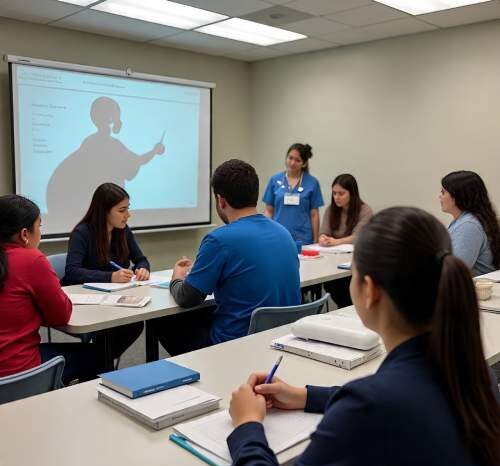Easy Guide: How to Overcome English Language Barriers on the NCLEX 2025

Easy Guide: How to Overcome English Language Barriers on the NCLEX 2025
For many internationally educated nurses, passing the NCLEX goes beyond medical knowledge—it requires a strong command of English. The exam is written entirely in English, and this creates a significant challenge for candidates whose first language is not English.

That is why understanding How to Overcome English Language Barriers on the NCLEX is essential in 2025. This guide will provide practical strategies, proven techniques, and realistic tips to help foreign-trained nurses not only understand exam questions but also express clinical reasoning effectively in English.
The NCLEX is more than just a multiple-choice exam. It tests your ability to think critically, prioritize patient safety, and apply nursing knowledge in real-world scenarios—all within the context of English phrasing, idioms, and medical terminology. Many capable nurses fail, not because they lack knowledge, but because they misinterpret questions due to language barriers. By learning how to master common phrases, strengthen reading comprehension, and practice active test-taking strategies, you can overcome these challenges and boost your confidence on exam day.
In this article, we will walk you through step-by-step methods to break down language obstacles—from improving medical vocabulary to practicing with NCLEX-style questions in English. You’ll also discover how to use resources like English-for-nurses study guides, NCLEX preparation apps, and peer study groups to reinforce both your nursing knowledge and your language skills. Most importantly, you’ll gain the confidence to approach the exam knowing that language will not be a barrier to your success.
Whether you’re a nurse from Asia, Africa, Latin America, or Europe, this easy guide will empower you with tools to bridge the gap between your clinical expertise and English fluency. By applying these strategies, you’ll be well-prepared to understand the nuances of NCLEX questions, avoid common traps, and achieve your dream of becoming a licensed nurse in the United States.
Top 10 Best NCLEX Study Guide Books for 2025: Reviews and Pass-Rate Tips
Common English Language Barriers on the NCLEX
Before learning How to Overcome English Language Barriers on the NCLEX, it’s important to recognize the specific challenges that many internationally educated nurses encounter.

These barriers often go beyond basic grammar and vocabulary—they directly affect comprehension, decision-making, and exam performance.
1. Medical Terminology and Abbreviations
Many NCLEX questions use medical abbreviations, clinical jargon, or advanced nursing vocabulary. Even experienced nurses may misinterpret terms if they haven’t practiced them in English.
2. Complex Question Structures
The NCLEX often presents long, scenario-based questions that include distractors. Candidates may struggle not because they lack knowledge, but because they misunderstand the phrasing or key verbs like assess, implement, prioritize, or evaluate.
3. Cultural and Idiomatic Expressions
English test questions sometimes use phrases or contexts that are culturally specific. Nurses may find it confusing when unfamiliar idioms or expressions appear in exam scenarios.
4. Reading Speed and Comprehension
Time pressure adds to the challenge. Slower reading in a second language can reduce the ability to finish questions confidently within the given time.
5. Listening and Pronunciation (for Practice Tests)
While the NCLEX itself is written, many preparation programs and study groups involve listening or speaking in English. Difficulty in expressing answers out loud during study sessions can affect confidence.
6. Test Anxiety Amplified by Language Barriers
Even well-prepared nurses may feel extra pressure when answering in English, which can lead to second-guessing correct answers.
Recognizing these barriers is the first step toward overcoming them. In the next section, we’ll explore practical strategies you can use to build English fluency while preparing for the NCLEX, ensuring that language does not stand in the way of your success.
Practical Strategies: How to Overcome English Language Barriers on the NCLEX
Overcoming language challenges requires a focused approach that combines both English skill-building and NCLEX-specific preparation.

Below are proven strategies to help internationally educated nurses succeed:
1. Strengthen Medical Vocabulary Daily
-
Create flashcards for common NCLEX terms, medical abbreviations, and nursing actions.
-
Use apps like Quizlet or Anki to practice definitions and usage in context.
-
Focus on “action verbs” such as assess, intervene, monitor, delegate, and prioritize, as these guide the correct answer.
2. Practice with NCLEX-Style Questions in English
-
Use prep books or online banks that mimic NCLEX format.
-
Read questions aloud to train both comprehension and fluency.
-
Review rationales in English to understand how answers are explained.
3. Improve Reading Speed and Comprehension
-
Time yourself while answering questions to simulate exam pressure.
-
Highlight keywords like first, best, priority, or safest, which are critical in NCLEX logic.
-
Break down long questions into smaller parts to avoid confusion.
4. Join English-Speaking Study Groups
-
Partner with peers preparing for the NCLEX.
-
Conduct discussions in English to build confidence.
-
Teaching others in English reinforces your own understanding.
5. Use Targeted English Resources for Nurses
-
Explore English-for-nursing textbooks and online modules.
-
Watch U.S. or U.K. nursing tutorials on YouTube to familiarize yourself with healthcare language.
-
Practice writing short care plans or SBAR reports in English.
6. Train with Simulation and Mock Tests
-
Take computer-based NCLEX simulations under timed conditions.
-
Use adaptive practice exams to mimic the real test format.
-
Focus not only on the right answer but also on reading and interpreting questions quickly.
7. Build Confidence in English Communication
-
Listen to NCLEX prep podcasts or nursing audiobooks daily.
-
Record yourself answering sample questions in English and replay for improvement.
-
Don’t aim for perfect grammar—focus on comprehension and clarity.
By combining these strategies with consistent practice, you’ll improve both your English fluency and exam performance. Remember, the goal is not just to learn English, but to use it effectively to think critically and make safe nursing decisions on the NCLEX.
Easy Guideline: How Long Does NCLEX Processing Take for Foreign Nurses 2025?
Best Resources & Tools to Overcome English Barriers on the NCLEX
If you are preparing for the NCLEX in 2025 and English is not your first language, using the right resources can make a huge difference. Below are some recommended tools to help you master both the language and exam content.
1. NCLEX Preparation Books with Rationales
-
Saunders Comprehensive Review for the NCLEX-RN – Includes detailed rationales in English, perfect for improving comprehension.
-
Kaplan NCLEX-RN Prep Plus – Offers question strategies and explanations designed to simplify complex language.
2. Flashcard & Vocabulary Apps
-
Quizlet / Anki – Build personalized decks for medical terms, abbreviations, and NCLEX-specific phrases.
-
Medical Terminology Flashcards (Barron’s or Mosby’s) – Excellent for daily vocabulary practice.
3. English for Nurses Courses & Guides
-
English for Healthcare Professionals (Cambridge English) – Provides specialized medical English practice.
-
OET (Occupational English Test) Nursing Resources – Useful for developing professional healthcare language.
4. Online Practice Question Banks
-
UWorld NCLEX-RN – Known for realistic, English-rich questions and clear rationales.
-
NCLEX Mastery App – Offers mobile practice with rationales and study tips.
5. Listening & Speaking Resources
-
Nursing Podcasts (e.g., FreshRN, Straight A Nursing) – Great for improving listening comprehension and clinical language.
-
YouTube Nursing Channels (RegisteredNurseRN, SimpleNursing) – Provide video explanations that reinforce both nursing content and English.
6. Study Groups & Forums
-
Join Facebook or WhatsApp study groups where nurses practice NCLEX questions in English.
-
Use forums like AllNurses.com, where discussions are in English and often exam-focused.
By using these resources consistently, you’ll not only improve your English skills but also build confidence in approaching NCLEX questions. The more you practice in English, the more natural it becomes to process exam scenarios under pressure.
Common Mistakes to Avoid When Facing English Barriers on the NCLEX
Even the most prepared internationally educated nurses can fall into avoidable traps during the exam.

Understanding these mistakes—and knowing how to prevent them—can make a big difference in your NCLEX success.
1. Translating Questions Word-for-Word
-
Mistake: Some candidates mentally translate each question into their native language, which wastes time and causes confusion.
-
Solution: Train yourself to think in English by practicing with NCLEX-style questions daily. Focus on keywords and nursing logic, not direct translations.
2. Ignoring Key Action Words
-
Mistake: Missing words like first, best, priority, initial, or safest often leads to the wrong answer, even if you know the content.
-
Solution: Highlight or underline action words during practice. These determine the direction of your response.
3. Memorizing Without Understanding
-
Mistake: Some nurses rely on memorizing answers rather than understanding English phrases and rationales, which backfires on adaptive NCLEX questions.
-
Solution: Read rationales in English and explain them in your own words. This improves comprehension and long-term recall.
4. Neglecting Time Management
-
Mistake: Spending too much time rereading questions due to language difficulty can cause exam fatigue.
-
Solution: Practice timed quizzes. Train yourself to read, process, and answer efficiently.
5. Avoiding English Conversations During Prep
-
Mistake: Some candidates focus only on self-study in their native language, which slows English improvement.
-
Solution: Join English-speaking study groups or forums where you can discuss NCLEX questions aloud.
6. Overlooking Cultural Context
-
Mistake: Misinterpreting patient scenarios because of cultural or idiomatic phrases in English.
-
Solution: Expose yourself to U.S.-based nursing resources, videos, and case studies to become familiar with exam-style language.
By recognizing these mistakes early and adjusting your study methods, you can approach the NCLEX with greater accuracy, speed, and confidence—ensuring that English does not become an obstacle to your nursing career in 2025.
Conclusion: Mastering English for NCLEX Success in 2025
Passing the NCLEX is not just about medical knowledge—it’s about understanding how questions are asked, identifying priorities, and applying safe nursing judgment, all in English. For many internationally educated nurses, this creates an extra challenge.

But by learning How to Overcome English Language Barriers on the NCLEX, you can turn a potential weakness into a strength.
In this guide, we explored the most common barriers—like complex question phrasing, medical vocabulary, and cultural idioms—and provided step-by-step strategies to conquer them. With tools such as NCLEX prep books, vocabulary apps, nursing podcasts, and peer study groups, you can build fluency while also strengthening your exam performance. Avoiding common mistakes like over-translating or ignoring key action words will further improve your accuracy and confidence.
The demand for skilled nurses in the United States continues to rise, and international nurses play a critical role in meeting this need. By preparing early, practicing daily, and embracing English as part of your professional growth, you can succeed on the NCLEX in 2025 and take the next step in your U.S. nursing journey.
Remember: language is not a barrier, but a bridge. With the right mindset and preparation, you can cross it—and achieve your dream of becoming a licensed nurse in the U.S.
Why NCLEX Applications Get Denied for International Nurses 2025 – And How to Avoid It
Resources & References
If you’re preparing for the NCLEX in 2025, these trusted resources can help you improve your English skills while mastering nursing content:
-
NCLEX-RN Official Information – National Council of State Boards of Nursing (NCSBN)
https://www.ncsbn.org -
Saunders Comprehensive Review for the NCLEX-RN
Widely used review book with detailed English rationales. -
UWorld NCLEX-RN QBank
Online platform with NCLEX-style questions and in-depth explanations. -
Quizlet / Anki
Apps for building medical English vocabulary flashcards. -
RegisteredNurseRN YouTube Channel
Free nursing tutorials in English, helpful for listening practice. -
AllNurses Forum
https://allnurses.com – Online community for NCLEX discussions in English.





One Comment